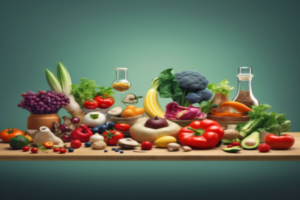The proliferation of diet trends, misleading advertising, and conflicting advice can leave one’s head spinning when trying to make informed decisions about nutrition. What’s the truth behind these widely touted diet myths? Let’s delve into the science.
1. Myth: Carbohydrates are your enemy:
It’s an oversimplification to label all carbs as bad. The scientific reality is that the type of carbohydrate matters more than the category itself. Refined carbs found in sugary drinks, processed foods, and white bread can contribute to weight gain and other health issues. On the other hand, complex carbohydrates found in whole grains, fruits, and vegetables are beneficial. They provide essential nutrients and fiber that aid digestion, regulate blood sugar levels, and make us feel full, preventing overeating. In fact, the Dietary Guidelines for Americans recommend that 45-65% of daily calories come from carbohydrates, predominantly the complex kind.
2. Myth: Consuming fat leads to weight gain:
Dietary fat has long been vilified due to its high-calorie content per gram. But in truth, we need fats for essential bodily functions such as nutrient absorption, hormone production, and brain function. The key is differentiating between unhealthy fats and healthy fats. Trans fats (in processed foods) and saturated fats (in red meats, butter) can increase the risk of cardiovascular diseases. However, unsaturated fats, found in olive oil, avocados, nuts, and fish, are heart-friendly. Instead of focusing on low-fat labels, prioritize consuming healthier fats and balance caloric intake with expenditure.
3. Myth: A calorie is a calorie, regardless of where it comes from:
The notion that ‘a calorie is a calorie’ overlooks the complexity of nutrition. Although the measure of energy—a calorie—is the same, the source of the calorie impacts how it’s processed in the body and the nutrients it provides. Calories from nutrient-dense foods like fruits, vegetables, lean proteins, and whole grains offer a wealth of vitamins, minerals, and fiber. In contrast, the same number of calories from sugary beverages or junk food offers little nutritional value and doesn’t satisfy hunger in the same way, potentially leading to overeating.
4. Myth: Meat is the only good source of protein:
While meat is a significant source of protein, it’s not the only one. Many plant-based foods, including legumes, lentils, tofu, and quinoa, are excellent protein sources. Incorporating a variety of protein sources can ensure you get a broad spectrum of amino acids and other nutrients. Several studies also show health benefits, like a lower risk of heart disease, from reducing red meat intake and increasing plant-based proteins.
5. Myth: Gluten-free diets are healthier for everyone:
Gluten-free diets are necessary for people with conditions like celiac disease or gluten intolerance. But for those without these conditions, there’s no proven benefit to going gluten-free. In fact, unnecessarily avoiding gluten could lead to missing out on essential nutrients found in gluten-containing whole grains. Gluten-free products often have less fiber and more sugar and fat than their gluten-containing equivalents.
6. Myth: Detox diets and cleanses are vital for removing toxins from your body:
The popularity of detox diets suggests that we need to cleanse our bodies of toxins regularly. However, our bodies are perfectly capable of detoxifying themselves. The liver, kidneys, and gastrointestinal tract continually process and remove toxins. There is little scientific evidence that detox diets enhance this process, and they can even be harmful, leading to nutrient deficiencies and other health problems.
7. Myth: Organic food is nutritionally superior to non-organic food:
While organic farming has environmental benefits and can reduce exposure to pesticides, it doesn’t inherently make the food more nutritious. Several large studies have found little difference in nutrient content between organic and conventionally grown foods. The most critical factor is eating a variety of nutrient-rich foods, whether organic or not.
To navigate the diet maze, the key is balance, variety, and moderation. Rather than hopping on fad diet bandwagons or falling for myths, stick to the basics: plenty of fruits and vegetables, whole grains, lean proteins, and healthy fats. Regular physical activity, adequate hydration, and mindfulness in eating are equally important. And always remember: what works for one person may not work for another. Individual needs vary based on age, health, physical activity level, and other factors. When in doubt, consult with a registered dietitian or healthcare professional.







